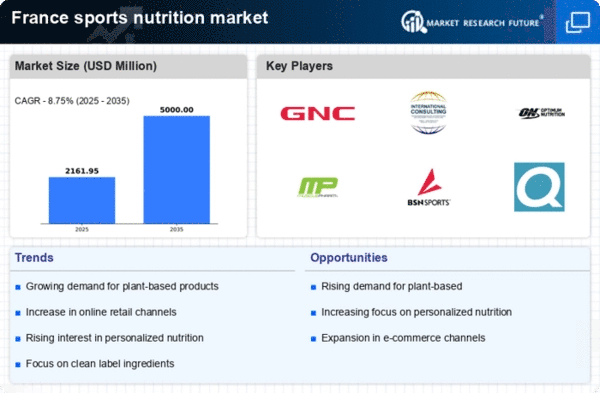The sports nutrition market in France is characterized by a dynamic competitive landscape, driven by increasing consumer awareness regarding health and fitness. Key players are actively engaging in strategies that emphasize innovation, product diversification, and regional expansion. Companies such as GNC Holdings (US), Herbalife Nutrition Ltd. (US), and Optimum Nutrition (US) are at the forefront, leveraging their established brand equity to capture market share. GNC Holdings (US) focuses on enhancing its product offerings through the introduction of plant-based protein supplements, which aligns with the growing trend towards veganism and clean eating. Meanwhile, Herbalife Nutrition Ltd. (US) emphasizes personalized nutrition solutions, utilizing data analytics to tailor products to individual consumer needs, thereby enhancing customer loyalty and engagement.
The competitive structure of the market appears moderately fragmented, with several players vying for dominance. Key business tactics include localizing manufacturing to reduce costs and optimize supply chains, which is particularly relevant in the context of fluctuating global trade dynamics. The collective influence of these major players shapes the market, as they not only compete on product quality but also on the efficiency of their distribution networks and customer service capabilities.
In October 2025, Optimum Nutrition (US) announced a strategic partnership with a leading fitness app to integrate its products into personalized workout plans. This collaboration is likely to enhance brand visibility and drive sales through targeted marketing efforts, as consumers increasingly seek integrated health solutions. The partnership underscores the importance of digital transformation in the sports nutrition sector, as companies strive to meet the evolving demands of tech-savvy consumers.
In September 2025, MusclePharm Corporation (US) launched a new line of performance-enhancing supplements specifically designed for endurance athletes. This move not only diversifies their product portfolio but also positions the company to tap into the growing segment of endurance sports, which has seen a surge in popularity. By catering to this niche market, MusclePharm Corporation (US) aims to differentiate itself from competitors and establish a strong foothold in a lucrative segment.
In August 2025, Quest Nutrition (US) expanded its distribution channels by entering into a partnership with major European retailers. This strategic expansion is indicative of the company's ambition to increase its market presence in Europe, particularly in France, where demand for high-protein snacks is on the rise. Such moves reflect a broader trend of companies seeking to enhance their geographical reach and capitalize on emerging market opportunities.
As of November 2025, current trends in the sports nutrition market are increasingly defined by digitalization, sustainability, and the integration of artificial intelligence (AI) in product development and marketing strategies. Strategic alliances are becoming more prevalent, as companies recognize the value of collaboration in enhancing innovation and market reach. Looking ahead, competitive differentiation is likely to evolve, shifting from traditional price-based competition to a focus on innovation, technology, and supply chain reliability. This transition suggests that companies that prioritize these aspects will be better positioned to thrive in an increasingly competitive environment.






















Leave a Comment